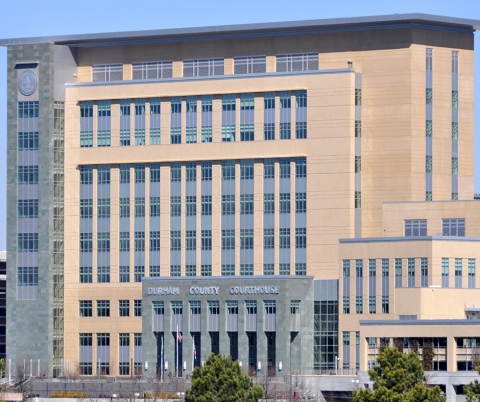Examining Racial Inequality and Reform Through Driver's License Access (2022-2023)
Lack of access to transportation has long been acknowledged as a barrier to employment, with most research focusing on lack of car ownership. However, the lack of a valid driver’s license is another type of transportation barrier that is less understood, and millions of people in the U.S. have had their driver’s licenses suspended for failure to pay fines from traffic citations. Racial and ethnic minorities, in particular Black Americans, are much more likely to have a driver’s license revoked, which contributes to other systemic racial inequalities, such as inequalities in the labor or housing markets.
Building on the work of the 2021-2022 team, one subteam investigated the impact of driver’s license revocation in Durham, where 46,000 county residents have a revoked or suspended license — approximately half due to failure to appear in court or pay fines. Members of the driver’s license subteam cleaned, coded and synthesized interviews with participants in the Durham Expunction & Restoration (DEAR) program, which waives unpaid traffic tickets and fines to help individuals get their licenses back. Team members also conducted further interviews for qualitative analysis to better understand the experiences of both program workers and participants.
Another subteam investigated how the Low-Income Homeowners Relief program created by the Durham Department of Social Services could affect individuals struggling to pay property taxes in the rapidly gentrifying city. They created a research protocol, conducted interviews with homeowners and developed preliminary policy recommendations.
Timing
Summer 2022 – Summer 2023
Team Outputs
License Suspension and Gentrification in Durham (2023 Fortin Foundation Bass Connections Virtual Showcase)
Freedom to Move: Durham Driver's License Access and the DEAR Program (poster by Anna Gassman-Pines, Clinton Boyd Jr., Adrienne Jones, Mary Lauren Veazey, Jenny Li, Audrey Wang and Jazmin Richter, presented at Fortin Foundation Bass Connections Showcase, Duke University, April 19, 2023; winner 2023 Bass Connections Poster Competition)
Supporting Low-Income Homeowners Through Property Tax Relief (poster by Anna Gassman-Pines, Warren Lowell, Brianna Johnson, Camilla Hanson and Rakshita Ramakrishna)
Adrienne Jones. Collateral Consequences: How Driver’s License Suspensions Create Barriers to Work ($15,000 grant awarded from Center for Equitable Growth, 2022)
Warren Lowell. Real Estate Investing and Neighborhoods in the American South (grant awarded from Russell Sage Foundation, 2022)
Reflections
This Team in the News
Driving Durham Forward: Assessment and Progress in Justice Reform
The Effects of Losing a License on Individual and Family Well-Being in Durham
Faculty Perspectives: Anna Gassman-Pines
Student Voices: Justice Reform Efforts in Durham
Bass Connections Teams Share Research Highlights at 2023 Showcase
See related teams, Promoting Racial Equity & Housing Stability in Durham Through Financial Relief (2023-2024) and Justice Reform Efforts and Effects on Self-Sufficiency (2021-2022).
Image: Durham County Justice Center, by James Willamor, licensed under CC BY-SA 2.0

Team Leaders
- Clinton Boyd Jr, Samuel DuBois Cook Ctr on Social Equity
- Anna Gassman-Pines, Sanford School of Public Policy
- Adrienne Jones, Public Policy and Sociology–Ph.D. Student
- Warren Lowell, Public Policy and Sociology–Ph.D. Student
/graduate Team Members
-
Jazmin Richter, Occupational Therapy-Doctorate
/undergraduate Team Members
-
Vineet Chovatia, Public Policy Studies (AB)
-
Camilla Hanson, Public Policy Studies (AB)
-
Brianna Johnson, Public Policy Studies (AB)
-
Jenny Li, Sociology (AB)
-
Chloe Nguyen, Public Policy Studies (AB)
-
Rakshita Ramakrishna, Public Policy Studies (AB)
-
Mary Veazey, Public Policy Studies (AB)
-
Audrey Wang, Classical Languages (AB)
/zcommunity Team Members
-
Durham County Department of Social Services
-
City of Durham
